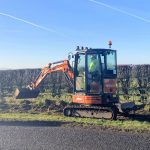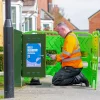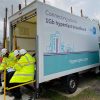Local Earl Stalls “Fibre Broadband” Upgrade for Devon Village of Upton Pyne
Residents of a small rural village called Upton Pyne in Devon (England), which is home to around 300 people, have been left in limbo after the final phase of Openreach’s (BT) “fibre broadband” upgrade in the area was stalled because a local earl objected to the cables going over his land.
At present local homes struggle to get broadband download speeds of above 1Mbps, with bog standard first generation ADSL Max (up to 8Mbps) technology being the order of the day via BT’s oldest 20th Century Network (20CN). Suffice to say that the village is in dire need of an upgrade.
The good news is that a new Street Cabinet has already been built to support an ‘up to’ 80Mbps capable Fibre-to-the-Cabinet (FTTC / VDSL2) service in the area. The bad news is that Openreach can’t connect the cabinet to a fibre optic cable because the Earl of Iddesleigh, who owns a big chunk of local land, won’t allow “either an overhead or underground cable across [his] fields” (Openreach statement).
Advertisement
Apparently most of the fibre optic cables and related overhead telegraph poles have already been built, although there’s a gap where four poles need to cross the Earl’s land and this is where the dispute exists.
Cllr Bob Short, Upton Pyne and Cowley Parish Council, said (BBC):
“In the interests of keeping the countryside looking pretty for everybody, nobody wants poles. But it’s the case that they’d not be the only ones in the area, there are poles everywhere. Surely four more isn’t going to be too much of an inconvenience for the countryside?”
However Lord Iddesleigh disputes this and says that he does not object to the new service but would rather the cables were buried than go over telegraph poles, which he fears could harm the “unspoilt valley.” This somewhat contradicts Openreach’s comment above and meanwhile the local community has been left in limbo.
Sadly disputes over wayleave agreements are nothing new and it’s an area that the Government hopes to tackle via their new 2017 Digital Economy Act, which will revise the old Electronic Communications Code (ECC) in order to make it both cheaper and easier to deploy new broadband and telecoms infrastructure on private land. Of course even those changes won’t completely prevent delays due to disputes over related work.
Earlier this year it was revealed that problems with gaining access to land had hampered Openreach’s efforts to roll-out ultrafast FTTP broadband services to cover around 40,000 premises in Wales (here). Issues like this crop up all the time.
Advertisement
Mark is a professional technology writer, IT consultant and computer engineer from Dorset (England), he also founded ISPreview in 1999 and enjoys analysing the latest telecoms and broadband developments. Find me on X (Twitter), Mastodon, Facebook, BlueSky, Threads.net and Linkedin.
« UK ISP Plusnet Reveal Broadband and Phone Price Rises for 2017


















































Comments are closed